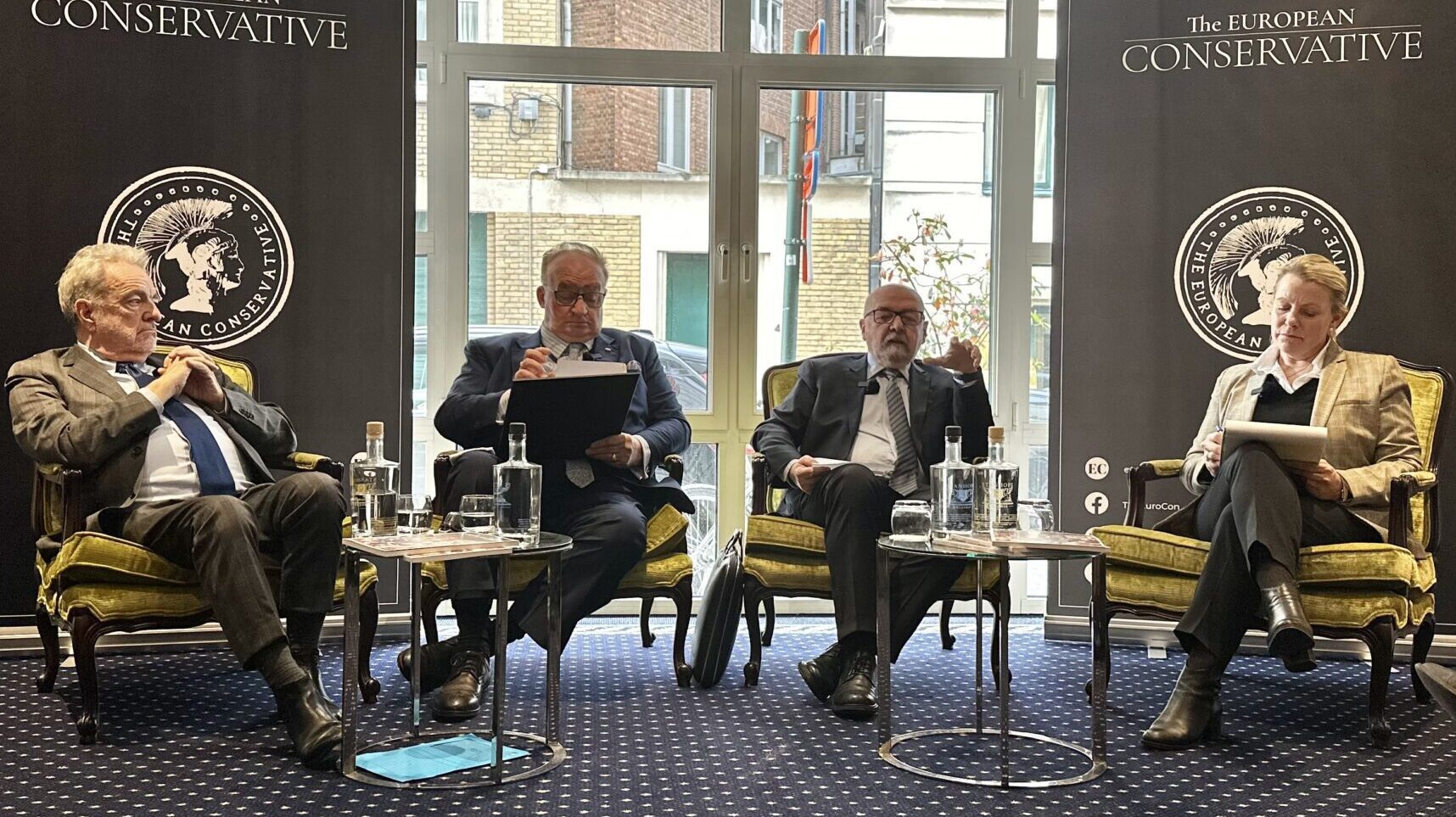
Gerolf Annemans, Jacek Saryusz-Wolski, Professor Ryszard Legutko, and moderator and The European Conservative Managing Editor Ellen Kryger Fantini.
Photo: The European Conservative
If you missed it live, watch the full footage of our event here:
What is wrong with the European Union right now? It is turning into a centralised, undemocratic block with no respect for the will of its citizens—according to participants in a debate organised by The European Conservative. Recent attempts by EU institutions to strip member states of their voting rights and take away even more competences from sovereign nation states are symptomatic of this problem.
Thank you for joining us today at our panel discussion on the EU’s federalistic treaty change proposals, featuring Professor Ryszard Legutko, @JSaryuszWolski & @gannemans. pic.twitter.com/Ka8jaNHWvW
— The European Conservative (@EuroConOfficial) February 20, 2024
The European Parliament in November adopted a report that seeks to amend the treaties of the European Union, liquidate member states’ veto rights, and give more power to EU institutions. While some Central European countries have opposed the proposals emphatically, Western European nations advocate getting rid of unanimous voting in favour of qualified majority voting in the European Council, the forum of the member states.
In the public event entitled ‘Ever Closer Union: Mapping the EU’s Federal Fantasies’, held in Brussels on Tuesday, February 20th, Jacek Saryusz-Wolski, Member of the European Parliament (MEP) for the Polish conservative Law and Justice (PiS) party said the proposals are centralist, not federalist, because the component parts of a federation are equal. In this case, larger nations would rule over the smaller ones: Germany, France, Italy and Spain would be able to outvote all the other member states.
Whereas proponents of the changes argue that the proposals encourage more democracy, Saryusz-Wolski believes the exact opposite would happen: even more competences moved to the EU level, leaving little or any decision-making with the member states; decisions would move from the level where democracy functions to one where it does not.
.@JSaryuszWolski: This is not a reform of the #EU #treaties, but a constitutional coup d'etat, an attempt to liquidate #nation states' #sovereignty. pic.twitter.com/GcY8hTjPse
— The European Conservative (@EuroConOfficial) February 20, 2024
The MEP says what we are witnessing is not a reform of the EU treaties, but a constitutional coup d’etat. In an attempt to liquidate nation states’ sovereignty, “Europe is being hijacked.” The EU is no longer working to reach consensus, and the European Commission is no longer acting objectively, as it should, but has become an enforcer, a punitive institution.
According to Jacek Saryusz-Wolski, the vision is to build an empire, neglecting the will of the people. He believes the concept of “ever-closer union”—mentioned in the treaties—is being abused to create a superstate by those who call themselves federalists, but are in fact centralisers. “We didn’t join Europe to fall back into a communist project,” the politician added.
Professor Ryszard Legutko is a member of the PiS delegation in the European Parliament and Co-Chairman of the European Conservatives and Reformists group. He argues that the statement itself—“creating an ever closer union among the peoples of Europe”—captures the essence of what is wrong with the EU. “If you have a system like this, it is an encouragement for the EU institutions to increase their power. In the course of time they will have more power. Why not start grabbing that power now?” he contended.
With regards to proposals to abolish unanimous voting, he said the right to veto is the most important tool for smaller member states to defend themselves against the arbitrary power of the strong players.
”This is their only weapon, the right to veto. With that being scrapped, they are at the mercy of the bigger players and the EU institutions. The end result is oligarchy, not some kind of federalism in its original sense,” he emphasised, adding that centralisation doesn’t necessarily result in the creation of a European state, but it increases the power of the big players, and diminishes those of weaker member states. EU institutions will become stronger because they will be provided with competences, while smaller member states will be deprived of their sovereignty.
Gerolf Annemans, MEP for the Flemish nationalist Vlaams Belang party, agreed with his colleagues, saying that, since the United Kingdom left the EU, the cooperation of member states has paradoxically turned into a speedy race towards centralisation, a unitary state. “We want a cooperation where member states and the peoples of Europe are not deprived of their rights. We need to return the power to member states. Europe must change for the better,” he said, adding that political forces who don’t agree with the centralisation efforts are branded extreme right, populists, authoritarian, or pro-Russian by those who call themselves ‘pro-European!’
Annemans argued that any modification of the treaties would only be legitimate if it was approved by European voters in EU-wide referenda. He said that “instead of more centralisation justified by political theatre and manipulation, we should negotiate a new EU treaty from scratch, to restore subsidiarity and democracy in Europe.”
